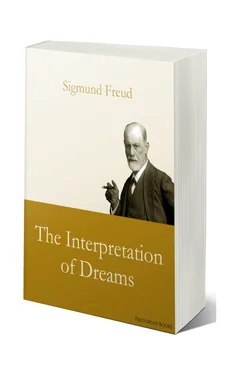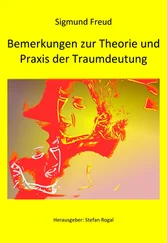Sigmund Freud - The Interpretation of Dreams
Здесь есть возможность читать онлайн «Sigmund Freud - The Interpretation of Dreams» — ознакомительный отрывок электронной книги совершенно бесплатно, а после прочтения отрывка купить полную версию. В некоторых случаях можно слушать аудио, скачать через торрент в формате fb2 и присутствует краткое содержание. Жанр: unrecognised, на немецком языке. Описание произведения, (предисловие) а так же отзывы посетителей доступны на портале библиотеки ЛибКат.
- Название:The Interpretation of Dreams
- Автор:
- Жанр:
- Год:неизвестен
- ISBN:нет данных
- Рейтинг книги:5 / 5. Голосов: 1
-
Избранное:Добавить в избранное
- Отзывы:
-
Ваша оценка:
- 100
- 1
- 2
- 3
- 4
- 5
The Interpretation of Dreams: краткое содержание, описание и аннотация
Предлагаем к чтению аннотацию, описание, краткое содержание или предисловие (зависит от того, что написал сам автор книги «The Interpretation of Dreams»). Если вы не нашли необходимую информацию о книге — напишите в комментариях, мы постараемся отыскать её.
The Interpretation of Dreams — читать онлайн ознакомительный отрывок
Ниже представлен текст книги, разбитый по страницам. Система сохранения места последней прочитанной страницы, позволяет с удобством читать онлайн бесплатно книгу «The Interpretation of Dreams», без необходимости каждый раз заново искать на чём Вы остановились. Поставьте закладку, и сможете в любой момент перейти на страницу, на которой закончили чтение.
Интервал:
Закладка:
Still other subjects mingle in the dream, whose relation to my release from responsibility for Irma's illness is not so transparent: the illness of my daughter and that of a patient of the same name, the harmfulness of cocaine, the illness of my patient travelling in Egypt, concern about the health of my wife, my brother, of Dr. M., my own bodily troubles, and concern about the absent friend who is suffering from suppurative rhinitis. But if I keep all these things in view, they combine into a single train of thought, labelled perhaps: Concern for the health of myself and others—professional conscientiousness. I recall an undefined disagreeable sensation as Otto brought me the news of Irma's condition. I should like to note finally the expression of this fleeting sensation, which is part of the train of thought that is mingled into the dream. It is as though Otto had said to me: "You do not take your physician's duties seriously enough, you are not conscientious, do not keep your promises." Thereupon this train of thought placed itself at my service in order that I might exhibit proof of the high degree in which I am conscientious, how intimately I am concerned with the health of my relatives, friends, and patients. Curiously enough, there are also in this thought material some painful memories, which correspond rather to the blame attributed to Otto than to the accusation against me. The material has the appearance of being impartial, but the connection between this broader material, upon which the dream depends, and the more limited theme of the dream which gives rise to the wish to be innocent of Irma's illness, is nevertheless unmistakable.
I do not wish to claim that I have revealed the meaning of the dream entirely, or that the interpretation is flawless.
I could still spend much time upon it; I could draw further explanations from it, and bring up new problems which it bids us consider. I even know the points from which further thought associations might be traced; but such considerations as are connected with every dream of one's own restrain me from the work of interpretation. Whoever is ready to condemn such reserve, may himself try to be more straightforward than I. I am content with the discovery which has been just made. If the method of dream interpretation here indicated is followed, it will be found that the dream really has meaning, and is by no means the expression of fragmentary brain activity, which the authors would have us believe. When the work of interpretation has been completed the dream may be recognised as the fulfilment of a wish.
III THE DREAM IS THE FULFILMENT OF A WISH
When after passing a defile one has reached an eminence where the ways part and where the view opens out broadly in different directions, it is permissible to stop for a moment and to consider where one is to turn next. Something like this happens to us after we have mastered this first dream interpretation. We find ourselves in the open light of a sudden cognition. The dream is not comparable to the irregular sounds of a musical instrument, which, instead of being touched by the hand of the musician, is struck by some outside force; the dream is not senseless, not absurd, does not presuppose that a part of our store of ideas is dormant while another part begins to awaken. It is a psychic phenomenon of full value, and indeed the fulfilment of a wish; it takes its place in the concatenation of the waking psychic actions which are intelligible to us, and it has been built up by a highly complicated intellectual activity. But at the very moment when we are inclined to rejoice in this discovery, a crowd of questions overwhelms us. If the dream, according to the interpretation, represents a wish fulfilled, what is the cause of the peculiar and unfamiliar manner in which this fulfilment is expressed? What changes have occurred in the dream thoughts before they are transformed into the manifest dream which we remember upon awaking? In what manner has this transformation taken place? Whence comes the material which has been worked over into the dream? What causes the peculiarities which we observe in the dream thoughts, for example, that they may contradict one another? (The analogy of the kettle, p. 87). Is the dream capable of teaching us something new about our inner psychic processes, and can its content correct opinions which we have held during the day? I suggest that for the present all these questions be laid aside, and that a single path be pursued. We have found that the dream represents a wish as fulfilled. It will be our next interest to ascertain whether this is a universal characteristic of the dream, or only the accidental content of the dream ("of Irma's injection") with which we have begun our analysis, for even if we make up our minds that every dream has a meaning and psychic value, we must nevertheless allow for the possibility that this meaning is not the same in every dream. The first dream we have considered was the fulfilment of a wish; another may turn out to be a realised apprehension; a third may have a reflection as to its content; a fourth may simply reproduce a reminiscence. Are there then other wish dreams; or are there possibly nothing but wish dreams?
It is easy to show that the character of wish-fulfilment in dreams is often undisguised and recognisable, so that one may wonder why the language of dreams has not long since been understood. There is, for example, a dream which I can cause as often as I like, as it were experimentally. If in the evening I eat anchovies, olives, or other strongly salted foods, I become thirsty at night, whereupon I waken. The awakening, however, is preceded by a dream, which each time has the same content, namely, that I am drinking. I quaff water in long draughts, it tastes as sweet as only a cool drink can taste when one's throat is parched, and then I awake and have an actual desire to drink. The occasion for this dream is thirst, which I perceive when I awake. The wish to drink originates from this sensation, and the dream shows me this wish as fulfilled. It thereby serves a function the nature of which I soon guess. I sleep well, and am not accustomed to be awakened by a bodily need. If I succeed in assuaging my thirst by means of the dream that I am drinking, I need not wake up in order to satisfy it. It is thus a dream of convenience. The dream substitutes itself for action, as elsewhere in life. Unfortunately the need of water for quenching thirst cannot be satisfied with a dream, like my thirst for revenge upon Otto and Dr. M., but the intention is the same. This same dream recently appeared in modified form. On this occasion I became thirsty before going to bed, and emptied the glass of water which stood on the little chest next to my bed. Several hours later in the night came a new attack of thirst, accompanied by discomfort. In order to obtain water, I should have had to get up and fetch the glass which stood on the night-chest of my wife. I thus quite appropriately dreamt that my wife was giving me a drink from a vase; this vase was an Etruscan cinerary urn which I had brought home from an Italian journey and had since given away. But the water in it tasted so salty (apparently from the ashes) that I had to wake. It may be seen how conveniently the dream is capable of arranging matters; since the fulfilment of a wish is its only purpose, it may be perfectly egotistic. Love of comfort is really not compatible with consideration for others. The introduction of the cinerary urn is probably again the fulfilment of a wish; I am sorry that I no longer possess this vase; it, like the glass of water at my wife's side, is inaccessible to me. The cinerary urn is also appropriate to the sensation of a salty taste which has now grown stronger, and which I know will force me to wake up.
Such convenience dreams were very frequent with me in the years of my youth. Accustomed as I had always been to work until late at night, early awakening was always a matter of difficulty for me. I used then to dream that I was out of bed and was standing at the wash-stand. After a while I could not make myself admit that I have not yet got up, but meanwhile I had slept for a time. I am acquainted with the same dream of laziness as dreamt by a young colleague of mine, who seems to share my propensity for sleep. The lodging-house keeper with whom he was living in the neighbourhood of the hospital had strict orders to wake him on time every morning, but she certainly had a lot of trouble when she tried to carry out his orders. One morning sleep was particularly sweet. The woman called into the room: "Mr. Joe, get up; you must go to the hospital." Whereupon the sleeper dreamt of a room in the hospital, a bed in which he was lying, and a chart pinned over his head reading: "Joe H.... cand. med. 22 years old." He said to himself in the dream: "If I am already at the hospital, I don't have to go there," turned over and slept on. He had thus frankly admitted to himself his motive for dreaming.
Читать дальшеИнтервал:
Закладка:
Похожие книги на «The Interpretation of Dreams»
Представляем Вашему вниманию похожие книги на «The Interpretation of Dreams» списком для выбора. Мы отобрали схожую по названию и смыслу литературу в надежде предоставить читателям больше вариантов отыскать новые, интересные, ещё непрочитанные произведения.
Обсуждение, отзывы о книге «The Interpretation of Dreams» и просто собственные мнения читателей. Оставьте ваши комментарии, напишите, что Вы думаете о произведении, его смысле или главных героях. Укажите что конкретно понравилось, а что нет, и почему Вы так считаете.












